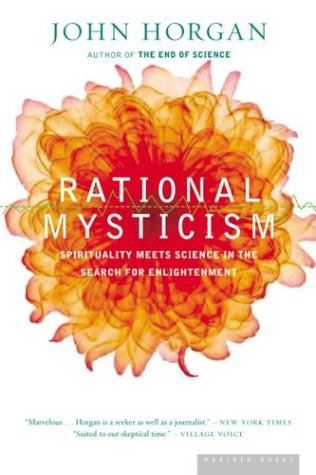John Horgan, a former reporter at Scientific American who authored such recent well-received books as The End of Science and The Undiscovered Mind, takes a stab at this popular genre. Rational Mysticism is one of the more entertaining books of this type, mainly because Horgan has kept his own spiritual musings to a minimum. The book is highly personalized in that Horgan shares details about his life and personal experiences. Yet instead of dwelling on his own somewhat vapid ideas, he travels around the world to interview some truly innovative spiritual thinkers, and these interviews serve as the foundation of his book.
Early on in Rational Mysticism, Horgan recalls his attendance at a goofy New Age “Science and Consciousness” convention held here in Albuquerque a few years back. At the convention, Horgan had a chance to chat with Huston Smith, a respected religious theorist and leading advocate of the “perennial philosophy.” Coined by German philosopher Gottfried Leibniz, this term describes the dubious belief that the world's established spiritual traditions, despite their obvious differences, “express the same fundamental truth about reality.” The crux of the perennial philosophy is that mystics from different times and cultures have glimpsed an underlying reality that transcends any individual mystic's time and culture.
The rest of the book largely consists of interviews with thinkers eager to point out the flaws in this philosophy. A lot of the people Horgan talks to, for whatever reason, seem to be Buddhists. A lot of them also tend to use psychedelic drugs.
One of the squirreliest of this bunch is Terence McKenna, a sort of neo-shamanic, cult-like figure who claims to believe that psychedelic drugs like magic mushrooms and DMT communicate messages from extraterrestrials. Yet McKenna, before he died of a gigantic brain tumor, always presented his unprovable quasi-spiritual ideas in an ironic, flippant fashion, leaving his more careful listeners wondering if he was serious.
Other thinkers interviewed by Horgan present their theories in a more earnest fashion, but few of them are significantly more convincing than McKenna and his fringe ilk. Admittedly, Rational Mysticism is an entertaining book—reading about unconventional religious beliefs is always more or less entertaining—but like most books in this genre you shouldn't, of course, expect to find any solid scientifically provable spiritual truths within these pages. My guess is that religion might always stand just a couple inches beyond the grasp of standard, reductive, scientific inquiry. In that sense “rational mysticism” is an oxymoron, an amusing Zen koan that looks nice on a cover but doesn't really mean all that much.









